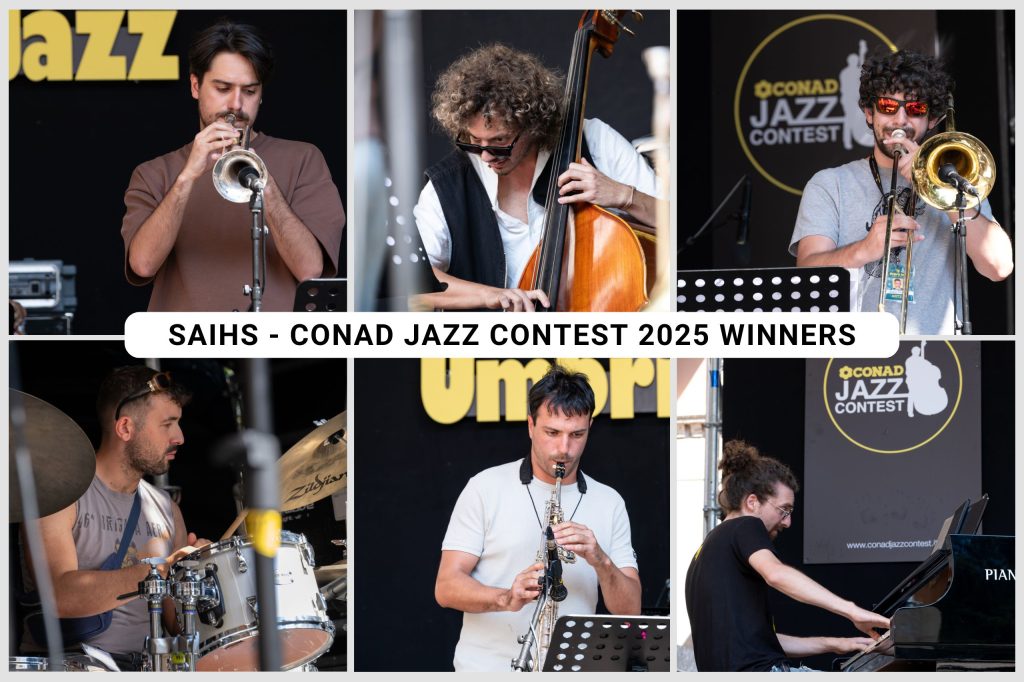We interviewed the overall winners of the Conad Jazz Contest 2025, the Saihs. The band consists of Giulio Tullio on trombone, Giulio Mari on trumpet, Giulio Barsotti on double bass, Matteo Zecchi on tenor saxophone, Edoardo Battaglia on drums, and Lorenzo Fiorentini on piano.
The Saihs perform a jazz repertoire of original pieces, drawing inspiration from the sounds of modern and contemporary jazz and arrangements of traditional jazz standards.
Next week, we’ll focus on the band and its members. For now, here’s how they responded to their first official interview as winners!
How do you feel after winning the contest? What are your initial emotions and reactions?
After the initial shock and excitement of winning one of the most prestigious and recognised emerging jazz band competitions on the international scene, we immediately realised we were facing an unmissable opportunity to showcase our repertoire to audiences on some of Italy’s most important stages and jazz festivals.
You’re no new to the Contest, having participated in past editions. How have you evolved musically over the years? What do you think gave you that extra push to win?
In May 2023, we decided to form the sextet specifically to participate in the Conad Jazz Contest. In that edition, we weren’t selected among the finalists. In 2024 and 2025, however, we had the opportunity to be among the 10 groups that performed at the Giardini Carducci during the Festival. A little over two years have passed since that first “attempt.” During this time, we have never lost the energy and determination to continue meeting to play or create arrangements of our pieces. We believe the success of 2025 is the result of a constantly evolving journey of growth, both individually and as a group. This is undoubtedly accompanied by a desire to share our daily experiences, even outside of music.
Have you had the opportunity to perform on other major stages before participating in this competition? How have these experiences influenced you as musicians?
Over the past two years, thanks in part to winning other competitions, we’ve been able to perform our music at major Italian jazz festivals (such as the Piacenza Jazz Festival and the Eddie Lang Jazz Festival) and record our first album. The thrill and commitment of performing our songs on stage have always been a stimulating experience for us, driving us to refine our approach to live performances continually. We view each concert as a small piece of a project of growth and development of our musical ideas.
How would you describe your sextet’s musical style? What are its main influences, and what distinguishing elements characterise it?
Our style certainly draws inspiration from the sounds of modern jazz. We all draw inspiration from the music of Immanuel Wilkins, Walter Smith III, and Joel Ross, for example. On the other hand, it’s impossible to ignore the tradition of jazz groups like the Jazz Messengers, or the ensembles led by John Coltrane, Miles, and Benny Golson. Jazz influences are also complemented by classical ones. In fact, most of us are following or have followed a classical and/or contemporary training. Faced with the diversity of all these musical influences, the risk has always been that of creating pieces that are stylistically inconsistent. One of the main goals, in composition, arrangement, and then in the concerting phase, was to bring all the pieces together within a common and recognizable sound.
What do you think struck the judges during your performances? Were there any particular moments that you felt made a difference?
We don’t know if there was a specific moment in our performance that made a difference in the judges’ eyes. Compared to last year’s edition, we performed songs with even more structured arrangements and stylistically different from what we usually play. We tried to give our music as fresh a face as possible. We did so by taking risks and questioning our identity. I believe that collectively, we took a risk that paid off.
See you next week to get to know the band better.



